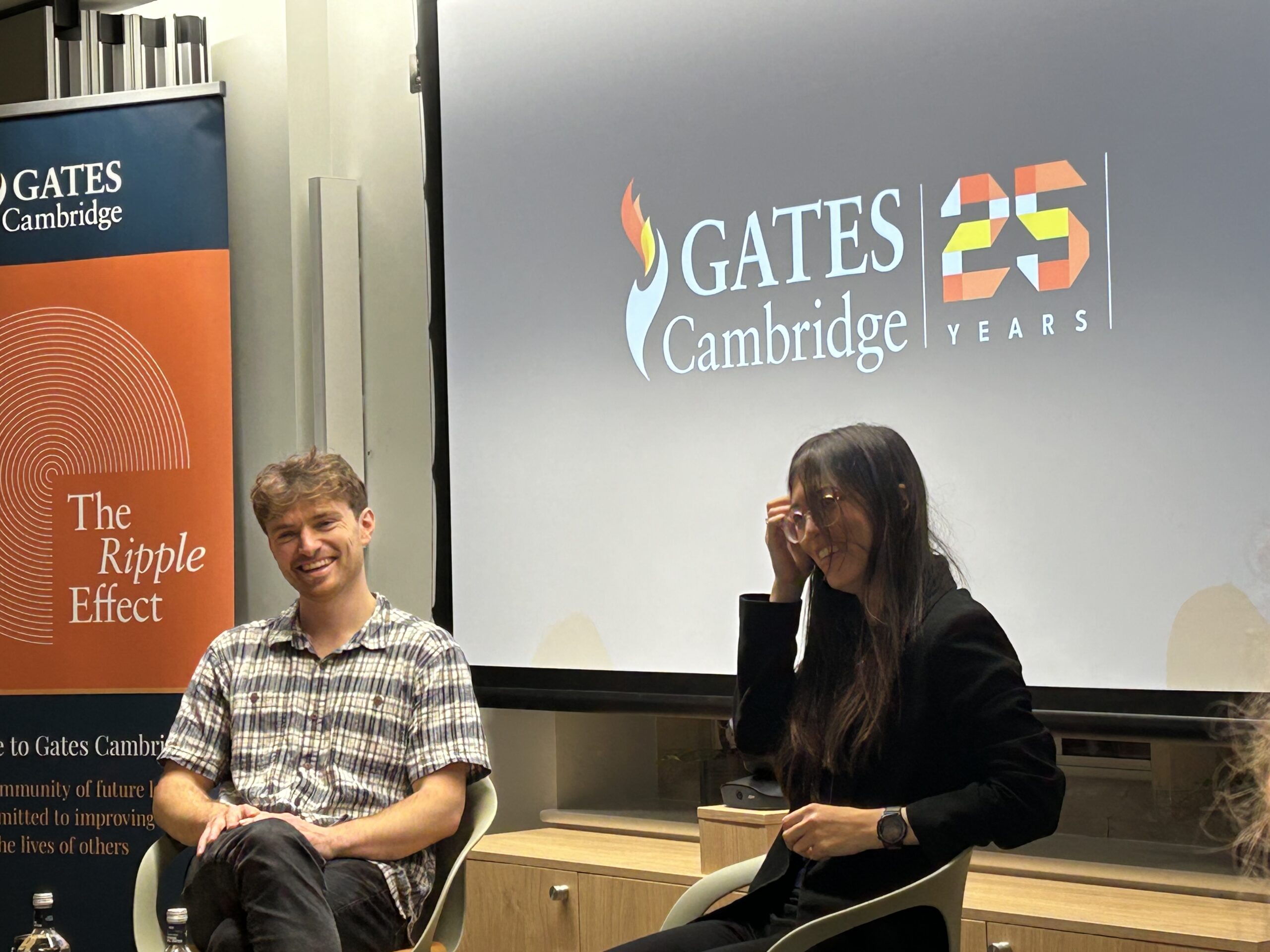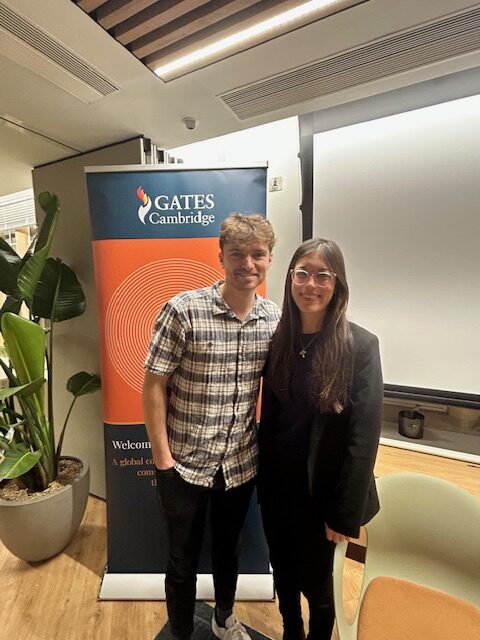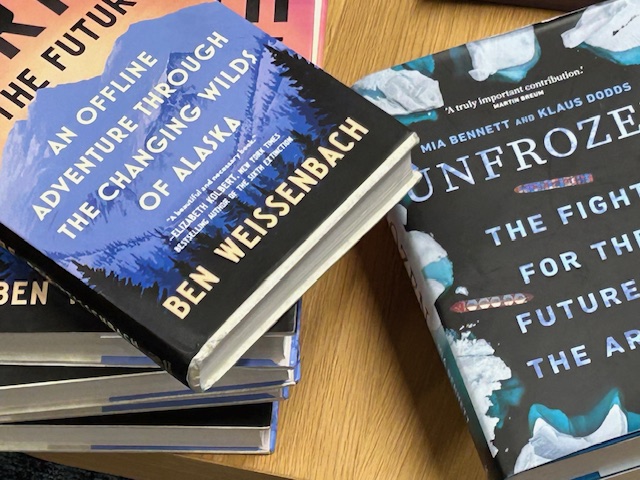
Ben Weissenbach was in conversation with fellow Scholar Mia Bennett about the past, present and future of the Arctic this week.
Two authors of the Arctic were in conversation at Bill Gates Sr. House this week to celebrate the publication of Ben Weissenbach’s new book North to the Future.
Ben was in conversation with fellow Gates Cambridge Scholar Mia Bennett [2012], associate professor of geography at the University of Washington and founder and editor of the blog Cryopolitics who has also just co-authored her own book, Unfrozen: The Fight for the Future of the Arctic.
Ben [2023] is a journalist who decided to leave behind his screen-bound life and venture to Arctic Alaska at the age of just 20. His book charts his experiences and conversations with environmental scientists along the way as he comes face to face with the impact of a fast-thawing region. Mia’s book explores the state of the Arctic today, showing how the region is becoming a space of experimentation for everything from Indigenous governance to subsea technologies.
In addition to reading passages from his book, Ben spoke about how studying what is happening in the Arctic provides a window on Earth’s future. He said the Arctic is warming three times faster than the rest of the world which could radically compound warming elsewhere. “Models can’t tell us what that means on the ground,” he stated.
The call of the wild
Ben said the motivation for writing the book was a craving for a world he hadn’t experienced. He had spent a lot of time indoors on a screen and wanted to go out into the natural world, inspired by authors such as Jack London and John McPhee.
 He did some short wilderness trips beforehand and learned through mentors how to ‘be outside and connect more to a place’. When he set off for Alaska he didn’t intend to write a book, although he pitched it as a reporting project. He aimed to learn from people from Alaska, explore how much the North is changing and how it will affect everyone and help readers think through their relationship with technology.
He did some short wilderness trips beforehand and learned through mentors how to ‘be outside and connect more to a place’. When he set off for Alaska he didn’t intend to write a book, although he pitched it as a reporting project. He aimed to learn from people from Alaska, explore how much the North is changing and how it will affect everyone and help readers think through their relationship with technology.
Mia asked him about the experts he met along the way. Ben said when he got to Alaska he asked people who he should talk to and many mentioned climate experts. They included Roman Dial, a larger-than-life ecologist with whom Ben ended up walking and rafting 1,000 miles across Alaska’s Brooks Range, tracing how the region’s trees are advancing northwards. Ben says he had not thought about forests in the Arctic before, even though the boreal forest is the world’s largest terrestrial biome, accounting for a third of all terrestrial carbon on the planet.
Ben spoke of the vastness of Alaska, the lack of infrastructure and the fact that there are fewer than one million people there which means you can walk for days and weeks without encountering anyone.
Another expert he met was Kenji Yoshikawa, a reindeer-herding, self-taught permafrost expert from Japan. His expertise relies on his own observation which means he can be sceptical of scientific modelling. Yoshikawa left Ben for 11 days in a cabin looking after his reindeer in -40 degrees temperatures. Despite his remote location, Ben said he had very good internet connection. Mia and Ben then discussed the pros and cons of connectivity, how the internet is changing the way people relate to each other and to their environment and how it can also help traditional knowledge to be shared and to survive.
Ben also met Matt Nolan, an independent glaciologist, who taught himself to fly and flew Ben to the largest glaciers in the American Arctic. He has produced maps of the area through taking photos of the landscape and is able to monitor changes over time with a good degree of accuracy. Ben said being on a glacier is completely different to looking at a picture of it. “It’s the sheer scale, the silence except for the sound of creaking, the way glaciers slide down mountains and make weird crevasses, the thing light does to them,” he said.
Why place matters
 Ben also spoke to indigenous people to understand the importance of generations of intimate knowledge of the land. He heard stories of winners and losers and experienced competing narratives. He saw how some valleys were falling apart as the permafrost thawed, saying it was like viewing an apocalyptic landscape, but he also experienced some of the wildest places on Earth [including being tracked by bears] and a feeling of continuity.
Ben also spoke to indigenous people to understand the importance of generations of intimate knowledge of the land. He heard stories of winners and losers and experienced competing narratives. He saw how some valleys were falling apart as the permafrost thawed, saying it was like viewing an apocalyptic landscape, but he also experienced some of the wildest places on Earth [including being tracked by bears] and a feeling of continuity.
In addition to speaking about how he got his book published, Ben talked about his next project and how he is interested in exploring how technology can redirect people back to the environment instead of just acting as an attentional vacuum, drawing us away from nature.
*North to the future: An offline adventure through the changing wilds of Alaska is published by Grand Central Publishing.
Unfrozen: The Fight for the Future of the Arctic by Mia Bennett and Klaus Dodds is published by Yale University Press.












